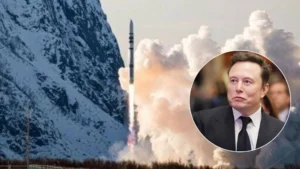Eurovision Week in Malmo, Sweden, has been marked by more than just musical celebrations. Thousands of pro-Palestinian demonstrators gathered in the historic Stortorget square on Thursday to protest against Israel’s participation in the popular music competition. The protesters, waving Palestinian flags and chanting slogans like “from the river to the sea, Palestine will be free!” voiced their opposition to Israel’s involvement, citing ongoing conflicts and calling for a cease-fire.
The demonstration, estimated to have between 10,000 and 12,000 participants, drew attention not only from locals but also from notable figures like Swedish climate activist Greta Thunberg. Voices from the crowd expressed sentiments that the timing of Israel’s participation amidst the Israel-Hamas conflict was inappropriate, emphasizing the need for peace before participation in cultural events.
The presence of Palestinian flags adorning the city’s streets, alongside the renaming of a pedestrian thoroughfare to “Eurovision street,” highlighted the strong sentiments surrounding the issue. While a smaller pro-Israel protest was held concurrently in another part of Malmo, pro-Palestinian groups plan to march again on the day of the Eurovision final.
Israel’s government issued warnings to its citizens regarding potential security risks in Malmo during the contest. Despite efforts by Eurovision organizers to maintain a non-political stance, controversies arose over Israel’s participation. While calls to bar Israel were rejected, organizers requested changes to Israel’s entry, reflecting the sensitivities of the situation.
Critics of Israel’s participation pointed to past instances where political events influenced Eurovision, such as Russia’s expulsion in 2022 following its invasion of Ukraine. Historians note that political controversies have often intersected with Eurovision, reflecting broader geopolitical tensions.
As Europe remains divided over the conflict in Gaza, Eurovision serves as a platform not only for music but also for political expression, underscoring the complexities inherent in the competition’s history and its role in reflecting the political zeitgeist of Europe.






















